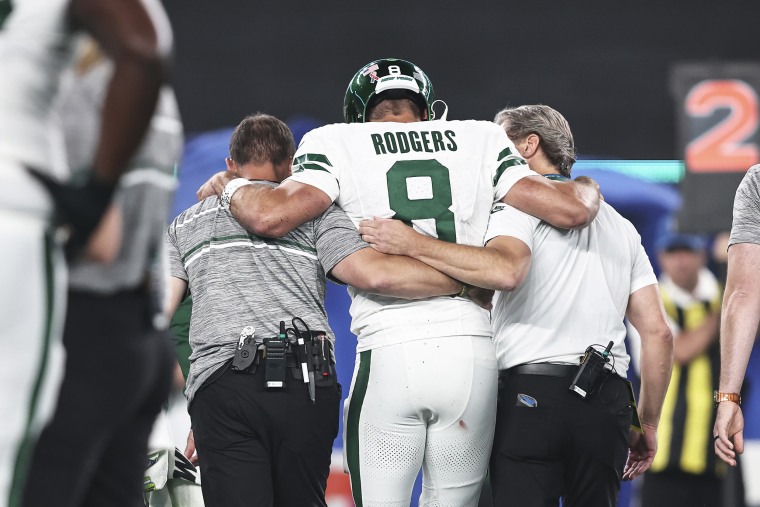As news of Aaron Rodgers' torn Achilles tendon spread on Tuesday morning, diehard football fans have been wanting an update on Rodgers' injury and asking two burning questions: Will the New York Jets quarterback return this season and how bad is the injury?
Here's everything we know about what happened to Aaron Rodgers, his ankle injury, what it means to have a torn or ruptured Achilles tendon and what his recovery time could look like.
What is Aaron Rodgers' Achilles injury?
Per NFL.com, Rodgers' MRI results show the football player has a complete tear in his Achilles tendon. This means that the tendon that links his calf muscles to his heal completely ruptured.

During his first game with the Jets on Monday night, Rodgers suffered an intense injury less than four minutes into the game. While being tackled by the Buffalo Bills' Leonard Floyd, Rodgers fell to the ground on his left leg. After standing up, he grabbed his leg and sat down again. Before leaving the field, he needed assistance.
Dr. John Vasudevan, a sports medicine physician with Penn Medicine who was watching the game, tells TODAY.com he was “immediately concerned” when he saw Rodgers stand up.
“(It was) as if he didn’t have pain, took one step and knew to sit back down right away. There was a sort of realization in his eyes that this is not going to work."
When the tendon is completely torn, Vasudevan explains, it’s “not as painful as you think. ... Patients almost always describe a distinct pop that they can feel and sometimes even hear. What people will describe more often than not is that they feel like someone kicked them really hard in the heel.”
According to Vasudevan, Achilles tendon injuries usually follow a similar pattern: The ankle is in a position where the tendon is stretched, and the person is "trying to push hard from the front of the foot." Simultaneously, there's "enough force to keep the stretch going on," he explains.
"As (Rodgers) was landing, he was trying his best to break free of a tackle that was already happening, and as the weight increased upon him and as he was pushing off in the front of his foot, there’s a quick little, almost stutter step with the heel, going back and then forward again. That is usually the telltale sign," Vasudevan says.
Were there any warning signs before Rodgers' Achilles injury? Last spring, Rodgers had a strained calf muscle in the same leg he just injured. Vasudevan says this is common with Achilles injuries, as it's "an indicator that they already have some tightness of that leg.
"That is a warning sign to really take care of flexibility and lower limb mechanics so that they can avoid a complete tear of the Achilles, which is what happened here," he adds says.
Will Aaron Rodgers be out the rest of the season?
Rodgers will not return this season so he can recover from his Achilles injury, according to NFL.com. The quarterback also didn't return to the game on Monday night.
What is a torn Achilles?
A torn Achilles occurs when the tendon that connects the calf muscle and the heal — the “largest and strongest tendon in the body," according to the Cleveland Clinic — tears, either partially or completely, as in Rodgers' case.
The injury occurs when the tendon stretches to its breaking point. It happens most often during sports but can affect anyone. "Tripping, falling or twisting your ankle can also cause an Achilles tear," per the Cleveland Clinic.
How do you treat an injured Achilles tendon?
There are multiple ways to treat an injured Achilles tendon. For starters, the Cleveland Clinic recommends the RICE (Rest, Ice, Compression, Elevation) method.
Other treatment methods include casts or braces and physical therapy. Surgery is also a possibility.
"Most providers recommend surgical repair of a torn Achilles tendon in people who are active and middle-aged or younger," the Cleveland Clinic notes. "During surgery, a surgeon stitches the two ends of the torn tendon back together. After surgery, you’ll need a cast on your lower leg to immobilize the tendon while it heals.
What is the recovery time from a torn Achilles?
It takes between four and six months to fully heal from a torn or ruptured Achilles tendon, according to Cleveland Clinic. Vasudevan agrees that six months is a common recovery timeframe.
For people who do not undergo surgery, the Hospital for Special Surgery says recovery from an Achilles tendon rupture process typically takes eight to 10 weeks, plus four to six months of physical therapy. For those who do get surgery, returning to all activities can take up to nine months.
For Rodgers' case, Vasudevan says that he will likely undergo a minimally invasive reconstructive surgery, which could have him bearing weight as early as two weeks, but it will depend on his specific surgeon's rehabilitation protocol. He adds that six months is the average for returning to play, but it could take longer.
Will Rodgers play football again?
It is definitely possible that Rodgers will return to playing football professionally, Vasudevan says.
"Based on the way that we know tendons recover, people can get back to sports. And even at his level, he’s got a good chance to play again given his competitive nature," he explains.
However, Rodgers will have a risk of re-tearing his Achilles tendon; Vasudevan estimates it's between 5% and 10%. He adds that in soccer, about 25% of players decide not to play again after having surgery for an injury, and while he's not sure of these stats for the NFL, he stresses that "not all hope is lost for Aaron."
Vasudevan notes that the psychological element of his injury may also play a role in whether Rodgers returns to the field: “(When) athletes come back a season later, technically cleared to play, technically still talented ... they always look a little more tenuous."